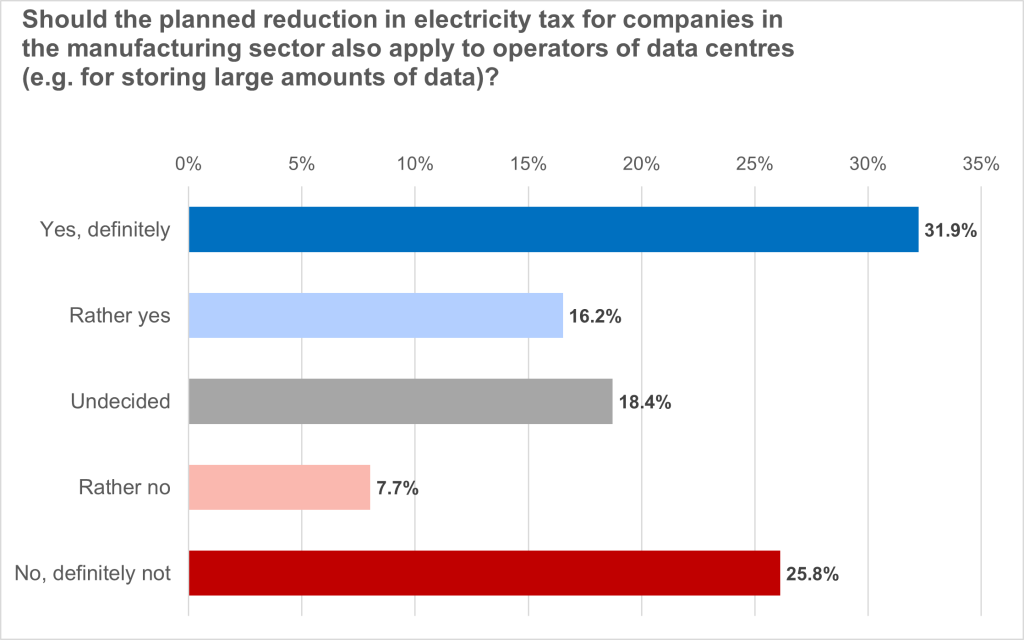Survey shows: IT decision-makers in Germany are in favour of electricity tax relief for data centre operators instead of further burdens
Digitalisation will significantly shape and transform the German economy. The potential for value creation in Germany is immense. Future technologies such as artificial intelligence in particular require a high-performance ecosystem of digital infrastructures.
Now that the German federal government has reached an agreement on the budget for 2024, it is clear that the CO₂ price will rise from 30 to 45 Euro per tonne next year, and network charges will no longer be subsidised by the German federal government. The expected further increase in electricity costs will also have an impact on the ecosystem of digital infrastructures – especially data centres, warns the Alliance for the Strengthening of Digital Infrastructures in Germany. The initiative, which was founded under the umbrella of eco – Association of the Internet Industry, fears a reduced expansion of data centres, with these urgently needed for digital transformation. This would lead to a progressive deterioration in the general conditions for companies in Germany.
“It is good that the German federal government has finally reached an agreement in the budget dispute, but for data centre operators, this compromise is bitter: it will make the already high energy costs in Germany to climb even higher,” says Dr Béla Waldhauser, Spokesperson for the Alliance for the Strengthening of Digital Infrastructures in Germany. “This does not bode well for the global competitiveness of our companies.”
Ultimately, there would even be a risk of data centres migrating abroad. The Alliance for the Strengthening of Digital Infrastructures in Germany is therefore calling for political decision-makers to review how they deal with the operators of the digital infrastructure ecosystem.
Approximately half of IT decision-makers in favour of reducing electricity prices for data centres
As a survey conducted by the market and opinion research institute eco and its association initiative shows, the majority of IT decision-makers in Germany are also in favour of electricity price relief for the industry instead of further burdens. According to the survey, almost half are in favour of an electricity tax reduction for data centres (48.1 per cent). 18.4 per cent of respondents are undecided on this question.*
In this context, Waldhauser also refers to the German federal government’s previously missed opportunity to relieve the burden on data centres through a bridging electricity price: “Data centres are the foundation of the economy’s digital transformation and societal structures. If we want to promote future technologies such as artificial intelligence in Germany, we need data centre capacities. If we want to digitalise administration and streamline processes, we need data centres. And this simple equation also applies to all other digital applications and processes.”
Nevertheless, even before the budget crisis, the industry was not considered in the discussion about possible electricity price relief. Instead, the framework conditions in Germany could now deteriorate even further. “In the end, the energy required to operate data centres will become even more expensive than it already is today,” says Waldhauser. “The German federal government should urgently take countermeasures here; otherwise, it will jeopardise the attractiveness and sovereignty of Germany as a business location. It risks slowing down the expansion of further data centre capacities and the potential migration of data centres to other European countries.”
*The market and opinion research institute Civey surveyed 254 IT decision-makers in Germany between 28 November and 4 December 2023 on behalf of the eco Association and the Alliance for the Strengthening of Digital Infrastructures in Germany. The result is representative. The statistical error is 12.1 per cent.





